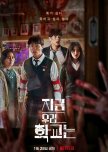
In spite of all the horror and struggle for survival, there is still room for the heart note
"All of Us Are Dead" isn't specific to South Korean culture, but it's not surprising that the story was born on South Korean soil... The story picks up on the sheer horror that South Korean youth are exposed to in the face of their brutal educational system. There, the enormous pressure to perform is higher than almost anywhere else in the world. For some, bullying is one way to reduce stress. The bullied, in turn, are doubly stressed. Other options include withdrawal, drugs, or suicide. South Korean society is largely blind and/or helpless in the face of this. The pressure to perform and, in this context, the psychological suffering of young people seems to be without alternative in view of the nationwide (and worldwide, economic) competition - a price that society has to pay in view of the greater good. And with that, the youngsters are left alone to somehow survive in this merciless world. However, this applies (perhaps not so blatantly) in a similar way to young people in many countries around the world.This is where "All of Us Are Dead" comes in its impressive and striking way.
The original title is something like "Currently at our school", so the focus is actually on the school and their students. In fact, the horror of everyday school life, which is more existential for some and less existential for others, mutates into a horror for everyone. A troubled father wants to create a way for his suicidal son to finally stand up to his bullies. The experiment goes astray. The vicious, zombie-like virus is sweeping the entire city and beyond. Disaster control, state of emergency, martial law - the whole program is needed to get the situation under control. And here, again, the young people are left alone in their existential need.
The story telling and expression of various group and relationship dynamics between the young people represent high-end KDrama quality - intense, powerful, sensitive, excellent. Almost everything is on the table. For me, this is the strength of this KDrama and the reason why worth watching.
Besides the problems, dynamics and approaches of trying to 'master' the threatening epidemic somehow sums up what we have had to go through worldwide in the past 2 years marked by Covid. When the rules are overridden, individuals (those who happen to have something to say) rule against the backdrop of their (helpless) personalities - arbitrary or scientifically based, rational or irrational, mostly driven by fear and from a safe distance and/or on the (argumentatively) safe side. Then real quick nobody takes side of individuals anymore, the big picture being more important...
Seen in this way, "All of Us Are Dead" is a qualitatively demanding KDrama in several respects. In spite of all the horror and struggle for survival, there is still room for the heart note.
However, I would like to emphasize that the virus is turning people into flesh-eating zombies. So the abundance of screaming, rattling, biting, blood-smeared zombie scenes, which simply lack any aesthetics for the eye and ear, is part of the story, too. In general this drama is brutal. This is obviously very popular in the international zeitgeist and thus (being published on the international netflix platform) stagily staged. I would say, brutal details and zombie-screentime could definitely have been less prevailing (in order to still tell the story).
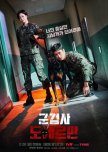
An extraordinary mixture - a fresh, fast-paced breeze, yet profound and multidimensional
"Military Prosecutor Doberman" brings a fresh, fast-paced breeze into the swamp of army power tussle and its entanglements with politics and business. The power tussle in this context is not new per se. But here it is convincing in proven, sophisticated, high-quality KDrama style. The story is critically focusing on the ruthless games of the mighty with honest ordinary people. By the way it is also shaking the noble, idealized concept of family -just a bit in passing by. Yet above all "Military Prosecutor Doberman" is impressively processing, disenchanting and denouncing the often (even without actual front war!) psychologically cruel everyday army life.As I mentioned before, the pace is quite high. There is cool talk and hip people. You´ll get action scenes as well. The soundtrack underlines the story pace with unusual hard beats and metallic sounds. But: nevertheless the KDrama wants to be emotionally profound and multidimensional. In case you consider that an imcompatible mixture, you're wrong. Here it works. And it's excitingly thrilling too.
"Military Prosecutor Doberman" creates an extraordinary blending. There is also a hint of romantic vibes. Just enough to round out the hard edges.
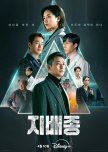
Crisp and tasty KDrama - revolving around some hot topics that one might rather want to call sci-fi
Intelligent, sharp, with strong characters. A crisp and tasty KDrama. “Blood Free” got me immediately - with an original hook, set within a gripping milieu, topped by thoughtful demeanor of interestingly authentic protagonists and splendid casting.Of course, the interfering natural interest of those in power (who obviously can never keep their hands off) is not at all surprising. Yet, the processing of some rather hot contemporary issues was presented in a refreshingly concise manner. Including topics that one might call a dream of the future... A bit far-fetched here and there? Perhaps. Nevertheless, often enough well grounded in common sense.
I assume there could as well be a second season... because the end doesn´t necessarily have to be the end, does it?
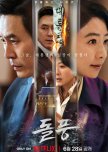
A very well done, substantial, self-critical, thought-provoking Korean-style political drama.
In “The Whirlwind,” the old masters of Korean film and television use their strong aura to demonstrate what it means to truly want to represent transparency and democracy in South Korea 2024. Even after several decades of 'real' democracy, the political apparatus still feels like a vice in the hands of a few in a backroom and every idiosyncratic move inevitably leads to pain. Here we see the top-class veterans Sol Kyung-gu and Kim Hee-ae and a few more in a Netflix production that has substance and intensity and decisively highlights a major dilemma within the South Korean political scene. A great script with characters who are not just black or white, but full of shades of gray.2024, as I said. Unfortunately, the struggle to act politically honestly, or to curb corruption and illegal influence by the Jaebeol conglomerates, obviously still is a Sisyphean mission... But there is this longing in the country – a desire that politics will at some point be done by responsible, accountable citizens and not manipulated by this 1 percent of the Jaebeol elite, using the system for their own benefit. ((On the other hand, as a mass, that is all too easily manipulated by misleading information the (in theory powerful) people ultimately doesn´t impress as a source of hope... Sobering. Unfortunately.)) Obviously it is difficult to change the sluggish but powerful apparatus. However, the more scandalous conditions and dynamics are clearly communicated through the media, the more the shiny elite may become disenchanted (as in "The Whirlwind"). And perhaps - the more this happens - at some point the general public will no longer be so easily swayed and deceived. Perhaps, slowly but surely, the number of those, who dare to oppose the whims of the so-called elite, no matter the cost, is against all odds growing. And maybe more and more will follow over time. This is, where “The Whirlwind” is coming from...
In 2024, South Korean politics is no longer just a male affair. Nevertheless, the world of decision-makers is still a world of cliques, and if one person is not willing, then force will be chosen. The pattern seems to be the same forever.
And yet. In this KDrama we are dealing with a protagonist, who doesn't care about all the headwinds. He isn´t impressed. He doesn't want to be bought and is resisting temptation. He might become a role model, yet he is driven by his own interest. He cares about the cause, the idea, his political values, and he risks everything for it. The end - the good, honest one - justifies the means. And suddenly an upstanding citizen also attracts others, too. He embodies a longing, stands for a hope that is truly shared by many - even those who have learned to function well within the corrupt apparatus. Where there is a will, there may be a path, but it can be rocky, swampy and, in some places, hopeless. Once again a brave David has faced off against a complacent Goliath. And if he's not careful, even our ambitious David may imperceptibly stray from the right path on his way to an honest goal. Because in fact, not every means justifies its noble end... When it comes to a world of responsible citizens who are equal before the law, then it is at the same time and first and foremost about accountability and about taking (lawful) responsibility for one's own actions. In all consequence. This equally applies to everyone, too. Uncompromising. Without exception...
So, overall I consider “The Whirlwind” a very well done, substantial, self-critical, thought-provoking Korean-style political drama.
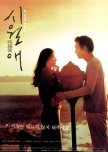
"Il Mare" gently sprays its quiet magic as if through an atomizer.
"Il Mare" is the ´international´ title of this KMovie. However, the original title (rather being translated as "Across Time") does not refer to the place - a picturesque house by the sea - but to what actually happens there: a time-transcending correspondence. Strictly speaking, the letters are sent back and forth in a mailbox over the distance of 2 years. What an unprecendeted plot for a love story to be told in a truly unique way! This story became famous in America and Europe in the 2006 US film adaptation starring Keanu Reeves and Sandra Bullock.Actually you shouldn't compare the two movies side by side, but most people do, so...
The South Korean original was made in 2000 and starred Lee Jung-jae, who was in high demand in South Korea at the time, and Jun Ji-hyun, who was just beginning her career. (Actually you can sense the difference in her acting back then and in her more recent productions. In the meantime she definitely has matured from a ´mere´ beauty into a spirited actress.) While the original shares the same plot as does the US remake later on, the South Korean version places more emphasis on the mood of the protagonists, stressed by using imagery, color and atmosphere. Accordingly, the South Korean original is characterized by less color saturation and less light than the US remake, as both protagonists - Eun-ju and Sung-hyun - are rather disappointed in life, taciturn, withdrawn. The loneliness and emptiness in the protagonists´ lifes is one aspect. The remote house by the sea something completely different. It might perfectly fit into the protagonists´ mood, but in addition it actually has quite some magic to offer: Besides framing and emphasizing the beauty of nature there is the dog as a harbinger of relationship and the mailbox as a bridge between hearts. Thus the overall sensitively told story slowly but surely fills with joy, smiles, laughter and increasingly radiating light.
The KMovie "Il Mare" gently sprays its quiet magic as if through an atomizer.
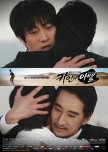
This is the first time I would actually describe a KDrama rich in makjang in terms of ´cool´.
"Cain and Abel" from 2009 presents itself in the best KDrama tradition of early 3rd Millenium makjang productions. In the background, the OST is repeatedly setting the rhythm proclaiming doom with implacable beats. The dramaturgical motifs are basically familiar: there are 2 more or less competing brothers, a wicked stepmother, a comatose father, amnesia in the meantime, two queens of the heart ... and what the hospital environment (specifically the neurosurgical department) has to offer is not just a brain tumor... It´s makjang at its finest. Eventually the scene is temporarily shifting to China, there also focusing on the unfortunate issue of North Korean refugees. It becomes action-packed and exciting. All in all, the plot doesn't seem too surprising at first glance, but as it progresses you might all of a sudden realize, how the story has long since grabbed and pulled you in.This is the first time I would actually describe a KDrama rich with makjang in terms of ´cool´.
Admittedly, here the bad guys are actually truely bad guys. Forgiveness is not a foreign word, but sometimes one may want to question this concept in principle, regarding the unscrupulousness and maliciousness of the perpetrators.
Title and story explicitly refer to the biblical motif: the first murderer case in human history told in Christian terms, where the older brother chose his younger brother as a victim. Out of envy. In the competition for recognition. Here it is the recognition as a brilliant neurosurgeon ... by the father, by the professional world, by the supervisory board (as head of a new center for neurosurgery) and as a man (by his queen of hearts). The mother wickedly helps and sows the bad seed, which grows effortlessly.
This fraternal quarrel (in which obviously not everything is and always has been quarrel) comes to live with high intensity by the performance of So Ji-sub (who appears in a quite bold manner for long stretches) and Shin Hyun-joon (who has already perfected his characteristic ´sad look´ in "Stairway to Heaven"). The two really get into their roles and take the viewers with them. The story gains as 'little Abel' covers a good distance in a parka and among refugees in China. So the story not only takes place in the elitist world of doctors, between surgical gowns and suits, but also gets more down-to-earthness in the struggle for survival of simple and non-privileged people at the opposite pole of social life. The two female leads Han Ji-min and Chae Jung-an also embody the contrast of these worlds in their own way.
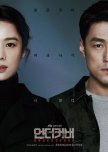
It is about the basic conflict between political ideals & dirty practice. Emotional complex.
Black meets white and every shade in between.Devious meets sincere.
Truth comes into conflict with truthfulness.
Justice wrestles with just behavior.
Even though the KDrama “Undercover” was produced as a remake of a British series, it still tells a very specifically South Korean story. In recent decades, the South Korean intelligence service has changed its name several times in the wake of turbulent political changes. Heads were exchanged here and there, but ultimately numerous agents and executives carried out their jobs both during the last years of the dictatorship, the first years of the increasingly democratic liberal government of the Sixth Republic and up to the present day. This means that those who had to be bitterly persecuted as enemies of the state at some point, became, at a different time, those who potentially needed to be protected at all cost… “Undercover” is set in that context.
Embedded in this is the emotional dynamic of a former undercover agent and his wife. She is now a committed human rights lawyer and the designated director of the newly established political office for corruption investigation. In principle, her agenda is to uncover those machinations in which her husband's employer was involved or even in charge at the time and to this day...
The dramatic dynamite is hidden underneath the fact that the husband missed the right timing of confessing to his wife what he actually had done before and who he was... for good reason. This secret apparently didn't stop the couple from leading a very happy family life to date. But fatally, his past comes knocking at his door, confronting him with an almost insoluble conflict.
Should he confess to his wife today what he did back then? However, she might never be able to forgive him. That would most likely be the end of the relationship.
On the other hand, if he continues to hide his past, his former colleagues will make sure she finds out. They would do anything to prevent an upright, honest and incorruptible person from taking this groundbreaking new political position, simply because transparency and secret service don´t get along so well…
Therefore:
If he wants to preserve the marriage and his family, his wife must never find out about his past. In order to prevent this, with a heavy heart he has to once again face the parallel world of secret service agents...
If he wants to protect his wife, considering the challenges of her new career, with a heavy heart he has to once again face the parallel world of secret service agents...
Either way, with a heavy heart he has to go back to the parallel world of secret service agents... There, it seems, not much has changed in the past 30 years. It is all about: unscrupulous in the service of the cause. By all means. Failure is not up for debate, whatsoever.
Accordingly, “Undercover” is full of emotional suspense, rather complex, and at times quite nerve-wracking. It is about the inner conflict within in this particular, rather mature marriage. It is about the basic conflict between political ideals and dirty practice. And then, it is also sobering when it comes to the question of whether power can ever really belong to the people...
I liked the emotional complexity and how the area of conflict – personal and political each – was developed. Plus the fact, that it was more about relationship dynamics than action. Therefore, I enjoyed watching it.
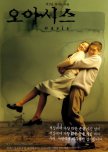
Thought provoking. Confronting the arrogance of the ´normal´. Truly outstanding acting performance
"Oasis" was highly celebrated by international film critics in 2002. Director and screenwriter Lee Chang-dong, who had with "Peppermint Candy" in 1999 already contributed a milestone in Korean film art, came up with this unusual love story between a mentally retarded young man and a young woman with infantile cerebral palsy. In doing so, he once again relied on Sol Kyung-gu and Moon So-ri, who had proven themselves as a couple in "Peppermint Candy" and who now once again deliver truly outstanding acting performances in "Oasis". The list of international awards – i.e. in Venice, Vancouver, Bergen, Brisbane, Seattle and Seville - as well as in South Korea, is long. And rightly so.“Oasis” is pure (independent) KMovie! It impressively embodies a great strength of South Korean movie production: ruthlessness! Even if social life is characterized by facades, coats, make-up and social reputations, modern South Korean cinema has (since the end of dictatorial censorship) proven what 'independence' really means. The freedom to finally show things the way they really are! Not being afraid of what is hurting, what is ugly, what is disgusting! The brutal revelation of the emotional abyss to which the human soul may be exposed over the course of a human life. Situations and moments in life that people tend/wish to quickly forget. The cruelties that people are capable of inflicting on each other. The look behind the facades and underneath the coats, where we are naked and without make-up, alone and vulnerable. But this is where we are sincere and real, too. From there, a new form of beauty and strength can grow. KMovies bring to light even the unloved, unpleasant, repressed, despised, perverted, uninhibited, disturbing human emotions with magnificent intensity, which are often presented so authentically that it hurts (because it's so true). The protagonists have no claim whatsoever to be likeable. This creative courage, when it comes to production and performance, as well as the audience´s willingness to open up to these cinematic works is (in my opinion) almost unique.
“Oasis” offers an impressive expression of this particular artistic attitude. This is a thought provoking KMovie confronting the arrogance of the ´normal´. The plot is about a young woman and a young man who – in the eyes of their social environment - preferably should be socially isolated and actually locked away, as they are supposedly unpresentable. Because of their disability, they are ultimately just a nuisance, causing work and trouble, irritating the 'normal' people with their unpredictable behavior, and actually not contributing anything... Because the families are ashamed of them.
The KMovie bluntly frames that social norms are in fact more important to 'us' than people. "Oasis" encourages to open up a bit and approach the lives of those 'waywards'. And lo and behold! They are sensitive, soulful people like 'us' - with feelings, dreams and longings. They are falling in love. They long for relationships. They are just people, too. Lovable people. Adults with their own lives.
'He' is a physically healthy man in his late 20s, but at the mental level of an 8 year old. He is strong, but easy to manipulate and rather simple-minded. 'She', on the other hand, is physically handicapped due to her severe infantile cerebral palsy to such an extent that she is dependent on help. Due to the impairment of her nervous system, which affects voluntary motor skills, speech disorders, spasms, as well as sensory and motor limitations are occurring, too. Intelligence isn't actually her problem, but that young woman in "Oasis" apparently wasn't given any specific assistance, just basic care. She has her difficulties communicating.
The way the families treat their ´waywards´ is horrendous. In fact, they are both unscrupulously exploited and abused. And both are helpless in their own ways. He doesn't fully grasp the situation. She is physically dependent on helping hands.
The romantic relationship between the two is quite something else. Their start can be considered downright dubious. And yet, as the odd couple they are, they both are happy together. The picture of the oasis on the wall jumps out of its frame and fills the room. In their togetherness, the couple has created an almost magic space where their souls can relate and recharge, where they can be a different person. It is touching, indeed. ´He´ is a responsible man and she is a desirable woman! Yet, this reality is completely alien to their social environment. The families don't have the slightest idea, that this could be even possible: those two ´handicapped losers´ being actually able to genuinely caring for each other and loving each other just the way they are. Not even their closest families honestly tried to truly reach out and attempt to understand their brother/sister.
Bringing the quality of this relationship against all odds authentically to the audience is the unique beauty and strength of “Oasis”. Although 'beauty' is not otherwise something, one would directly associate with this movie. There is hardly any beauty in the world of those two protagonists, where their environment isn´t taking them serious at all. They are either patronized or treated in a disrespectful and disdainful manner. Nevertheless, their feelings for each other radiate beauty and grace. Interaction may inevitably be rather awkward, but still they find their unique way. In the end, it all comes to an almost passionately brilliant finale when HE risks everything in order to by all means keep his promise to HER: sawing off the branches of the tree in front of her window, which only cast shadows on her beloved oasis picture on the wall...
The KMovie leaves us with our thoughts behind. Touched. And - substitutional for those two families, the police, the neighbors etc., who in their arrogance are blind to the inner world of those two lovers – ashamed, too.
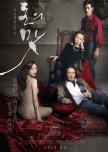
The focus on the absolutist self-image of the Jaeboel changes towards their very human weaknesses
"The Taste of Money" from 2012 bombards the audience with aestheticized images, a strangely bizarre stirring mixture of cynical decadence, insatiable greed and human weaknesses that even the richest of the rich don't stop at. Let's start with the moral of the story: money doesn't buy happiness. On the contrary. The more there is, the unhappier their owners get. They may be wealthy bank-wise, but humanly they are bankrupt. Maybe they can buy anything, but in fact they are (and remain) alone. Their relationships tend to be abusive, mostly cold, and rather an empty, highly polished shell.The KMovie focuses on a Jaebeol clan with a CEO, his wife, daughter and son, as well as the CEO's assistant and a filipino housekeeper.
----------- SIDE NOTE: --- Jaebeol, the secretive modern royalty of South Korea ---
The rich and powerful of South Korea emerged as a distinct variety in the post-war years. As a motor of progress and prosperity, they still influence social life as a matter of course - hidden, unofficially, from the background. In their hands gigantic possessions are concentrated. These are consistently maintained within the founding families. The Jaebeol clans were created as part of the autocratic governance of the early decades of the Republic and were further strengthened during the military dictatorship. The founders set the course for the economic upswing. In the meantime however they behave like the country's new nobility. They shamelessly and ruthlessly buy and bribe people at will. The remaining 99 percent of society are practically 'learned helpless' at their mercy. You have nothing to oppose to this power, which simply interferes with the legislature, judiciary and executive if necessary.
---------------------------------------------------------------------------------------------------
The protagonist's family is one of the first percent of the social class, which behaves as a matter of course as royal families. Here pomp, decadence, coolness, distance, and even obscenity dominate. The highly polished, stylized aesthetic stands in deliberate contrast to a rather gloomy lighting mood. The opulent wealth almost builds an aesthetic wall that cannot be penetrated. The family members are trapped inside. Nothing can or event likes to really approach that, let alone penetrate it. It is (and remains) a strangely strange world.
The idiosyncratic cinematic narrative style contributes to this. It doesn't even try to collect all the threads at the end and close them neatly. It's as if the camera jumped in on the family story at one random point and got off at another. At the beginning, the focus is on the corrupt machinations and the almost absolutist self-image, but that changes on the track after the very human weaknesses of the individual clan members open up. Although they pretend to be untouchable, they are still vulnerable and actually want to be touched. From there it becomes a more or less satisfactory settlement with their own heart balance. 'Love' is a concept in this world that doesn't really want to fit in.
One of the key scenes: Youn Yuh-jung is shown a 64-year-old woman in an unusual candid sex scene. A disturbing effect is deliberately wanted. In a way, this encounter between young and old, between boss and employee, points out the dilemma of the story, so to speak. In this short, impressive scene, the venal world of dependencies and emotional states is turned upside down. The rich have everything and yet they don't - there is something they don't have: the feeling of being wanted, desired or even loved for their own sake.
"The Taste of Money" is a somber social study about the 1 percent that sits at the top of South Korea's social pyramid. Once again. There is an astonishing number of such startling studies in the world of film and series. But it seems even more astonishing to me that there are obviously still far from enough of them. Because nonetheless, this 1 percent still sits dazzlingly on its throne and it is still considered highly desirable within South Korean society to get as far up the pyramid as possible...
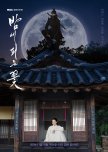
Cheeky, cheerful and heartfelt, drops of suspense included
“Knight Flower” is set in Joseon days, yet it is no epic, historical KDrama in a classical sense. It has endearing comedy to offer, the touch of a romance and even a touch of crime thriller, while the setting back then in Joseon is accounted for predominant neo-Cunfucian social ethics in those days. In particular, back then being widowed was bad news for women, whatsoever. (See side note). This circumstance is providing the hook for a cheeky and fresh-minded KDrama plot.In "Knight Flower", the widow simply cannot get herself to merely spending the rest of her long life in honorable, virtuous seclusion, mostly invisible to the rest of the world, trying not to be too much of a burden to her in-laws, and otherwise mourning the deceased husband (whom she never actually met) in the afterlife.
No, this widow does her own thing. She is not interested in being reduced to the virtue of mourning. During daytime, her everyday life is that of a honorable widow and decent daughter-in-law. Yet, at night she is dressed in black, wearing pants and a mask, climbing over walls, jumping over roofs and helping the poor – as "Midam", a kind of Robin Hood of Joseon. Such is her double life. All goes well, until one day...
While the plot is drawing its dynamic appeal from the actually rather sad background of a dubious tradition of treating widows (not only practiced in old Joseon, and not only back then…), the good news is: "Knight Flower", as a production broadcast in 2024, is built on intelligent emancipation, too. What is called for is not compliant bowing, but rather self-confident, creative solutions in dealing with life. Obviously South Koreans are craving for such a role model these days. The show was quite a success. People there apparently enjoyed it. So did I.
"Knight Flower" is cheeky, cheerful, and heartfelt, drops of suspense included, thus with alluring wit offering an enjoyably entertaining genre-mix.
------------------------------------------------------------
SIDE NOTE: --- Yeolnyeo or Yeolbu, the virtuous woman of Joseon ---
A loyal subject can only serve ONE king and a virtuous woman can only serve ONE husband. This perhaps briefly summarizes the core of the moral teachings of the period between the 14th century and the beginning of the 20th century. Practically speaking, this implied a widowed woman could face death penalty, if she ever wanted to marry again.
Women had to be obedient to their parents and in-laws. They had to honor their husband. And after his death the eldest son had the say... The greatest asset of a woman, besides bearing children, was her virtue. And that was eventually all that was left, if her husband might have died before herself. There was even granted an official award for valuing outstandingly honorable virtuous widows with the reputation of being a Yeolnyeo or Yeolbu. Thus they had to be particularly determined with living as a commendable model wife even after their husband´s death – according to all the rules regarding morals and daily routines as set out in detail in the book about good conduct for virtuous women…
However, the pressure on widows to be respected as Yeolnyeo became excessive over time. At some point it was even common for widows to consequently take their own lives, too, thus expressing their praiseworthy being loyal to the husband until the bitter end. In this way, they could posthumously provide their family (or that of their deceased husband) an honorable glory of virtue in which all family members could bask. Eventually, suicide was even expected of a widow – especially if she became a widow at a young age...
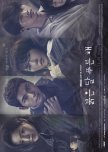
A strong production. A bold story that comes across without make-up by Korean standards
If you're looking for a KDrama of the usual type, then you won't find it in "Children of Nobody". Here you are dealing with an impressive psychological thriller with lasting influence that comes across without make-up by Korean standards. This is about child abuse. The powerful here are not the economic giants, but the parents in their sacred halls. Not funny. The story wants to stir you up and it does. In the original, the title is actually "Red Moon, Blue Sun" and alludes to modern South Korean poetry that has been quoted several times. In connection with the crimes against children, poetry seems downright paradoxical.If "Children of Nobody" at the time didn't make spectacular waves in the ratings, it's not because it wasn't done convincingly, but because there are a large number of unreported families in South Korea for whom physical abuse and the "stick of love" are still taken for granted. Sooner or later, these viewers would have to take a good look at their own noses. The topic is treated in a differentiated manner from a wide variety of perspectives.
----------------------------------------- SIDE NOTE: --- child abuse vs free, upright citizens ---
If people are broken mentally and physically from an early age, how are they supposed to learn to live as upright citizens? The road to free, responsible citizens still seems a long way off. 20/30 years ago in South Korea - without high technology, ubiquitous internet and social media - many people in their personal world largely only knew people for whom these practices of physical abuse were also a matter of course. The children and young people of today and the young parents of tomorrow, on the other hand, grew up in a time when they could learn a lot more about alternative living environments, value systems and educational concepts through the media. The field of consciousness is expanding. Conflicts with traditional structures arise. New perspectives are given space. In the exchange via social media, resistance and support can form, discussions are held and new values and self-images spread. Change becomes possible.
---------------------------------------------------------------
KDramas increasingly provide positive models of how things must become different in the future. In its own way, it tries to straighten things out in the context of child abuse that many take for granted.
Therfore "Children of Nobody" is a strong production. A bold story. A commitment to a future with free, responsible citizens - precisely because they are ruthlessly confronting with where society (in South Korea) actually stands.
Fantastic actors. Captivating story. Highly valuable.

A refreshingly sassy KDrama, critically reckoning with the South Korean education system (and love)
“The Midnight Romance in Hagwon” promises a love story with its international title - and that's what we get. Jung Ryeo-won and Wi Ha-joon are creating the relatively adult, authentic aura of a tender but complicated love relationship between a former graduate and his former tutor. Yet, the two are more than a couple. Today, as teachers, they inspire each other to teach didactically creative. And in doing so, they also inspire their students.Thus, the KDrama, which in the original means something like “The Graduate”, basically offers more than a romance. It is rather a quite critical reckoning with the South Korean education system. The criticism: It's less about education than about grades -and a lot of money is involved in getting good grades. The students learn the correct answers to their questions. They therefore receive any effective support outside of school, mainly in the tutoring academies, provided their parents can afford it. However, there is one thing, the students don't learn: how to ask the right questions. They don't learn to question or get to the bottom of something. They know their material they have to memorize and what formulas they should be able to apply. Everything else is not part of the entrance exam or a prerequisite for qualifying for admission to one of the three large SKY universities. It has to be Seoul National University, Korea University or Yonsei University (S, K and Y), if anyone in South Korea is to become something...
"The Midnight Romance in Hagwon" aka "The Graduate" takes stock of the prevailing, dubious, even misleading values of a society, still trying to convince the people that they have to obsessively achieve something in order to be valuable of some sort.
When it comes to the academy teaching staff, it is about tailor-made exam preparation, courting parents an acquiring new students. Looking to the right or left, seeing a student as an individual human being with dreams and needs, let alone respond to them? Oh my! Whether it's students or scandals, it's never about the people. It's always about the money. A lot of money. The competition is enormous. The South Korean education market is a lucrative economic engine that is humming along happily.
This KDrama offers a wonderfully staged, emotionally sensitive and vivid approach to these issues, using the fate of various ambitious, highly motivated teachers who would like to try something different, but are not allowed to. They are surrounded by elitist parents who are ready to do anything for the glorious future of their beloved, dearest offspring. They are also surrounded by fiercely competitive academies that are just waiting for someone to make a mistake, because then those protégés can easily be poached and their own coffers start ringing instead...
What a refreshingly sassy KDrama, dealing with all those issues...
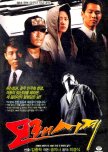
Haunting. Powerful. Taciturn. Unforgettable.
"Sandglass" is a KDrama that relentlessly, sophisticatedly and yet sensitively processes the pain of the South Korean people, that paves the path towards actual democracy. Here you can get a glimpse of a cultural phenomenon: 'Han', a collectively shared sense of painfully experienced injustice (see side note below). "Sandglass" is one of the first KDramas daring to use the medium of television for more than just entertainment. It is also one of the first who could even dare to do so. Here, recent contemporary history is critically targeted from all sides. And at the same time, it becomes a collective vigil for freedom of speech and opinion, for freedom of travel and for the rule of law that have only recently been painfully achieved."Sandglass" tells the story of three young people who were friends during the 1970s and 1980s - Park Tae-soo (Choi Min-soo), who actually would have liked to study but made a career as a thug in gangster milieu, Kang Woo-suk (Park Sang-won ), who hopes for the power of the law and thus studies law, and Yoon Hye-rin (Go Hyun-jung), sort of imprisoned within the golden, solid cage being the daughter of the most influential, officially tolerated casino king in the country, who systematically suplies the government with his money from gambling via anonymous bank accounts. Jumping back and forth in time, the fatal emotional bond between the three is unraveled against the background of social events. It is a dramaturgically conscientious reckoning with the military dictatorship, its abuse of power and its crimes against the people. Original film documents were seamlessly played in, i.e. during the staging of the Gwangju massacre. The presentation of the Samchung re-education camp was also staged as realistically as possible on the basis of original photos and documents. The second half of the story then goes through the destinies of the three protagonists in mafioso style: the gangster, the prosecutor, and the heiress to the casino king. The finale is on the one hand the moment of free election for the people (running in the background), and on the other hand the result of the personal (more or less free) choices of the three protagonists, who still share a world in which despite all recent tumult and uprising basically not much has changed...
More than half of the South Korean population watched the 1995 KDrama "Sandglass". It was praised and praised again. Hard to believe, that it is these days hardly available for streaming with subtitles, never mind as DVD. Apparently, those who have a DVD are reluctant to give it away. I can understand, after I actually saw the KDrama myself - first only in the original version without subtitles (wasn't that bad, because mostly there isn't much talk :-) ), then with a time delay also with subtitles (it was definitely helpful :-) ), and by now also knowing a little more about that historic background. "Sandglass" is truly a masterpiece. Yes, it is taciturn, thrives on the acting, on long shots and on purposefully used, deliberately reduced light. It doesn't sugarcoat anything. It wants to let it sink, each and every moment. The camera accompanies the events almost like a documentary. Without comment, sequences, events, moments in time stand side by side. The story unfolds like a suction and draws you in. The soundtrack supports this pull effect. The story takes its course, the course of which is known, i.e. is predictable: Park dictatorship / suppression of democratic aspirations under the pretext of North Korean infiltration / Chun Doo-hwan supreme military leader, commander of the security and finally new president by coup d´état / martial law, Gwangju Uprising and massacre / cleansing camps / June 1987 fight, abolition of censorship, end of military dictatorship / free elections in 1992. Amazing and grandiose that via TV series a critical review of those bloody 1980s was already possible in 1995. It's brilliant, too, how the protagonists with their very different backgrounds, values and goals are fatally interwoven and mercilessly swallowed up by historical events and social circumstances.
A fantastic K-Drama. Completely consistent. first class.
A sad story. Not funny. Not at all. You have to be able to get involved with the dramaturgically idiosyncratic, taciturn handwriting. (The mood should be right, so to speak.)
(And yes, it's an old ham when it comes to production quality. Screen format, picture and sound quality can hardly keep up with the Netflix era - a digital remastering would definitely be desirable...)
Anyone who is interested in the topic but can't get to the KDrama can grab an impression of the Gwangju massacre in "Youth of May" (2021), or a feeling for the time under military dictatorship and for the concentration camps in "Giant" (2010).
However, if you have the opportunity to see "Sandglass", I recommend that you go for it. Even without historical or socio-cultural interest, KDrama has a lot to offer in terms of impressiveness and melodrama.
------------------ HISTORICAL BACKGROUND INFORMATION -----------------------
Admittedly, being able to classify the historic events, helped for me. E.g. at the beginning there are scenes in which thugs and police bus-wise arrive at a building and disperse the opponent party´s event. This was actually the key historical point, marking the beginning of the massive social unrest, which resulted in actual free elections 13 years later. In fact, it was originally a comparatively small strike in 1979, which took place on the 4th floor of the New Democratic Party's headquarters. Around 200 women, workers at the textile company YH Trading Corporation, protested against the closure of their factory. Unions had no place during Yushin dictatorship, however his sit-in-demonstration was actually almost too minor, to interfere. Nevertheless, the government used the particular context at the opposition party building as a cover for a major anti-opposition operation - 'Operation 101'. Around 1,000 police officers in uniform and civilian gangs of thugs assaulted leading party members and 174 of the demonstrating women workers. Union leader Kim Gyeong-sook died while jumping out of the window.
The civilian thugs (fictional Tae-soo in "Sandglass" being one of them), were subordinate to the main money-provider of the regime (here the casino king and Hye-rin's father, who clean-washed his income for political means.)
That factory workers´ trade union action by no means was the reason for the following uprising. However the occasion served as the momentum for what was to come. Against this background, the later (fictive) encounter between Hye-rin and one of those women from 1979 becomes understandable. Hye-rin adores the by now torture-broken woman for her brave fight for democracy back then. That woman, however, never wanted a political revolt, she just didn't want to lose her job. In fact she feels betrayed and instrumentalized in a political fight that she really didn't want to fight and in which she lost everything, even herself, her dignity and self-respect.
Responsible for the politicization of events that had taken on a dynamic of its own, was actually the Park regime itself: it´s attempt to split and suppress the opposition. By demanding the party leader Kim Young-sam and his deputies to resign from their mandate provoked and politicized the public. Since this coincided with the beginning of the winter semester, the student movement, too, took the incidence for a red-hot political profile: demanding the end of the Park government. A corresponding demonstration in Busan was violently suppressed in this context. A few days later, president Park was assassinated by the head of the Korean Central Intelligence Agency (KCIA). This assassination had nothing to do with the students and their demands. Neither does North Korean Communism. It just coincided timewise with the Busan demonstration. The military, in turn, took advantage of the political power vacuum situation, imposed martial law on the mainland, installed a far-reaching investigative body and thus paved the way for the meteoric rise of Chun Doo-hwan, who was appointed chief investigator. He used his chance consistently and purposefully. After 8 months of military coup, the country had a new dictator in uniform who presented himself as the savior of the nation.
He repreatedly and systematically declared the pro-democracy drive the enemy by spreading conspiracy and infiltration theories about North Korea's ambitions. Press and public were massively manipulated with so-called K-operations (king´s operations) in order to convince the people by the good of military rule. The credo was: the military and Chun Doo-hwan were the only chance to counter the spreading, communist-manipulated unrest, in creating something like order and security. At the same time, the military units were drilled with the so-called Choongjung (True Heart) training for a particularly aggressive and efficient suppression of demonstrations. New paratrooper units were created as special forces. In addition to physical fitness, the training included the development of a strong corps-spirit and the use of massive violence and targeted abuse.
Against this background, the situation among the military units deployed in Gwangju in May 1980 can also become somewhat more understandable. On the one hand, they were brainwashed. On the other hand, to date it has still not really been clarified who gave the orders for the escalating violence in May 1980 - e.g. orders to shoot and the use of paratroopers. Internal ambivalence and irritation was common at all levels of command. But that didn't help. In the end the corps-spirit was more binding and prevailed. In this respect, the executing soldiers, as perpetrators, somehow became victims in those sad May days, too. The proclaimed enemy - North Korean Communism, which is behind the pro-democracy movement - and the unshakable pillar of power - the military dictatorship with all its arrogance - posed such a strong, effective, powerful threat, so that it was so frightening people in uniform (and without) and made them hitting their brothers and sisters indiscriminately (again, after barely three decades). Because someone had chosen Gwangju as the place of the example. And because the sides there had just turned out that way - those who lived in, studied in or visited Gwangju on the one hand, and those who were doing their military service at nearby barracks at the time. On the other hand, the political vision or just a simple wish, that everybody might finally live freely under fair conditions, seemed hopeless. Suddenly the fight was (rather apolitical) about pure survival and desperate rebellion against arbitrary violence.
Eventually, with "Sandglass" the South Korean population became seriously aware of what had really happened in Gwangju in 1980: a people´s uprising against military oppression, being brutally suppressed. Because of the propagandistic K-operations and the censorship (which was repealed only in 1987), knowledge of these events was never really able to spread. Numerous witnesses had deliberately been put into camps or imprisoned. For the television audience in 1995, these street-fighting scenes must have come as a complete shock, not only because they are terrifying in themselves (regardless of where and when), but because they actually had taken place in such brutal manner and in such close proximity completely without their knowledge. In this way, "Sandglass" also became the trigger for nationwide latest history processing. The TV production paved the way for more critical historical scrutiny in the media and also apparently accelerated the course of the trial and sentencing of ex-President Chun Doo-hwan in 1996. He was sentenced to death. (However, on appeal it was turned into a life sentence. His assets, of course, were safely parked, too. He died of cancer in 2021.)
---------------- Side note: --- NATIONAL SECURITY ACT ----
The National Security Law has been in force in South Korea since 1948 - until today. Its primary purpose was to push through anti-communist propaganda and to control or shut down opposing intellectuals, artists, journalists, students etc.. This National Security Act de facto restricts freedom up to this day and ultimately violates the 1948 Universal Declaration of Human Rights and the 1976 International Covenant on Civil and Political Rights, which South Korea had actually ratified. Fatally, it seamlessly continues a relic from the days unter Japanese rule. Several 100,000 people have fallen victim to this law over the past few decades. The verdicts resulted in prison sentences of thirty to forty years, which is among the longest in the world. It has served military dictatorships well, opening the door to arrest and torture countless times. Even after the end of the dictatorship, as late as 1989, obviously an average of 3.3 people each day were arrested, tortured and sentenced to prison under this national security law. To this day, the law is still officially considered constitutional...
--------------- Side note: --- RE-EDUCATION, CLEANSING AND CONCENTRATION CAMPS ---
A unique dubious institution during the Chun Doo-hwan dictatorship were the concentration camps for re-educating unwanted citizens. 25 such camps were set up in the aftermath of the Gwangju massacres. They served to systematically clear the streets of South Korea of unwanted people (and yet mostly arbitrarily as a military demonstration of power). The camps were primarily used for brutal abuse - any dignity was broken, body and soul pushed to the limit.
The detainees were divided into 4 categories: A implied prison; B and C an agonizing time in one of the re-education camps; D a warning. Category B and C inmates often ended up in prison as well, provided they survived the re-education camps. E.g. a former military prison in Yeoncheon, Gyeonggi was thus modified according to 'Samchung Plan No. 5'. This location officially was established to fight North Korean Communism: up to 100,000 innocent people may have gone through hell without a warrant - and rarely enough survived.
--------------- Side note: --- HAN ---
Han can be considered a collectively shared, identity-forming cultural pain in the sense of sad and angry grief. This cultural characteristic developed in the course of Japanese colonization of Joseon. There has been, and still is, debate about the extent to which Han can or cannot be considered a collective trait that creates identity. In any case, as a shared painful experience of that time, a specific form of expression of grief developed, while behind melancholy suppressed anger also resonates. Han has found its very unique solemn, deeply and sadly swinging aesthetic in Korean culture, which we can observe/feel in music, film, television, literature, poetry etc. It can be considered a collectively shared state of mind, that feeds on the traumatic experience of humiliation and abuse as a people that Joseon endured so massively at the hands of the Japanese oppressors. Han addresses helplessness in the face of overwhelming injustice. But despite all the pain and sadness, there is also something tough in Han: an inner resilience, a rebellion, that still provides something like strength in the darkest depths.
Han was further nurtured in the post-Joseon era by the separation of families into two antagonized nations. Finally those brutal 1980s, which are revived in "Sandglass" in the sense of a solidary vigil, tie directly to this collective Han - as a basic feeling that continuously and silently runs through (especially) the first half of the KDrama. A collective emotional state from which one cannot escape: the experience of suffering; the ability of suffering; the national destiny of suffering.
In the course of South Korean turbo-capitalism over the past two decades, Han as an issue has receded somewhat into the background among the younger generation. Nevertheless, there is already a new, modified, less beautiful form of expression: ´Hwabyeong´, the culture-specific Korean manifestation of a depressive psychosomatic disorder with characteristic symptoms, that already affects wide circles - as a result of suppressed anger in the face of overwhelming social circumstances experienced as unfair. (e.g. victims of any sort of bullying in school or at work etc.)
(I wonder, whether it would not be better to continue to give Han an explicit, contemporary, aesthetic expression - in contrast to the embellished, perfected facades e.g. in KPop + KDrama culture... but that would be another topic.. .)
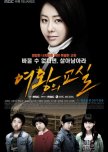
@ mobbing, friendship, class culture and reflecting moral behavior among 6th grade pupils. Great!
"The Queen's Classroom" is a dramaturgically fascinating story about kids at a South Korean elementary school, shortly before their transition to middle school. The young actors are fantastic. Likewise the adults. At the same time, it is a nuanced, clever study of bullying from 2013. I appreciate this series very much because it not only shows THAT there are enormous social problems with an increasingly traumatizing marginalization of young students, but also how/that the school, i.e. the teachers, can contribute in a creative, constructive, pedagogically valuable way, and thus counteract the trend. For this reason alone, "The Queen's Classroom" is worth seeing. In addition, the KDrama tells a wonderful story about the idea of friendship - about how the mere concept and label 'friendship' becomes a real, three-dimensional relationship with a solid grounding. Fabulous.The unique approach is a focus on the age between elementary and middle school - a phase that is crucial in the development of personality, e.g. for the cognitive development with regard to the moral assessment of situations, the ability to change perspective and a differentiated understanding of moral values. Eventually, the moral assessment of mobbing/bullying is the crucial first step in order to seriously counteract the ominous trend. This aspect is a characteristic problem in South Korean schools. (See side note below.)
In the case of "The Queen's Classroom", the homeroom teacher sets important impulses for the personal processes of individual pupils and the class as a whole with quite idiosyncratic, (of course also dramaturgically effective), provocative pedagogical methods. The aim is to use paradoxical intervention in order to trigger more profound emotional and cognitive processes, so that the students can move from the sometimes naive surface of their beliefs to their true, genuine core. On this basis only can they then stand their by all means noble, idealistic convictions powerfully and authentically against adverse circumstances. Personal processes can often be a bit painful, as is the case here. However, the result is quite spectacular for the individuals and for the class as a whole, too. It could/should be something like this or something similar, it HAS to be if the increasing trend of bullying in schools is to change.
Chapeau! "The Queen's Classroom" is boldly leading the way as a small but mighty pioneer in the KDrama world. To be fair, the KDrama is based on a Japanese production. Since the social problem is similar there, it is not surprising. In any case, the Korean remake didn't do any harm... Despite all the emotional seriousness, it's a great pleasure to accompany the kids on their bumpy road.
---------------------------------------
SIDE NOTE: --- Wang-ta - Bullying in a collectivistic society, like South Korea ---
While 'mobbing', strictly speaking, refers to psychological terror or physical violence by a group, 'bullying' describes the harassment itself, regardless of how many people take part in it. However, the choice of term does not change the fact that far too many students are involved - be it as victims, as perpetrators or as spectators/witnesses. This is an international phenomenon, with more or less extreme manifestations. There is peculiarity in South Korea, though: collectivism (vs. Western individualism). When the welfare of the collective has the highest priority, it means that the interests of the individual are subordinated to those of the associated social group - be it family, work, school, class, club, friends, etc. Peer pressure also exists in individualistic Societies, true enough, but in collectivism it has an even stronger impact. This should not be underestimated when dealing with the topic of mobbing/bullying.
'Wang-ta' is a specific, common South Korean slang term that is used in connection with and in dealing with a person who is not part of the group. One becomes an outsider very quickly, wearing the wrong clothes, having the wrong interests or preferences, belonging to the wrong group or to no group, having poor, stigmatized or less influential parents, living in the wrong family constellation or only achieving bad grades. However, this label commonly implies (in collectivist society) that it socially 'is allowed' to devalue and harass this person for being an outsider. When group norms are thus strong, such exclusion based on appearance, lack of achievement, special preferences, etc. can have particularly fatal consequences. Those experiencing 'Wang-ta' first hand, may lack the chance of getting rid of this label again.
- Those who 'choose' the victim are hardly aware of any guilt, since they are convinced, that they are rightly criticizing a deviation from the set norm.
- The other peers will thus avoid the stigmatized pupil and assume that there is something to it, so that the label (and exclusion) is justified.
- And those labeled ´wang-ta´ will only withdraw even further, ashamed of their 'apparent' lack, and feel even more inferior, than they might already do.
Empirical studies in 1998 ff with pupils from European or American countries (with individualistic socialization) showed, that in 85 percent of bullying cases peers were involved as bystanders. Of those, only 11 percent eventually intervened. Unfortunately, I don't have any comparable South Korean numbers, neither from then nor from today. However, I probably don't lean too far out of the window when I suspect that there are significantly less, who would actively intervene.
In the course of further international studies it was possible to prove that intervention by peers is, however, an essential first step towards change. Active intervention on-site in the middle of the situation triggers a (moral) debate among the peers about the situation in the first place. As long as there are only passive, tolerating bystanders, the act is socially approved and its justification defacto confirmed.
There are South Korean studies that show: although the majority of the pupils interviewed do not like bullying, at the same time they also believe that it is inevitable. In fact, they assume, that the victims in general deserve to be punished because of their (self-inflicted) being an outsider.
The peer group has the greatest influence during the school years from late elementary school to high school. At the same time, this is the phase in which generosity in dealing with diversity can and must be learned as an essential social value. If such a value is not socially recognized at that time, then young people will not be able to integrate it into their further lives, let alone apply it. This is the painful crux of the issue of "wang-ta" in South Korean schools (or later in the workplace): generosity in dealing with diversity has no tradition, no culture, no socially recognized value on the peninsula. If you want to change the school bullying trend, then you have to start here. I.e. as a teacher in elementary and middle school, opening up spaces for experience with tolerance and thus creating the opportunity for a new culture of social interaction. A confident class culture that explicitly acknowledges diversity, that socially and openly and explicitly questions wang-ta as a social option, can form the fertile breeding ground for fundamental societal changes that leave more room for individuality. In the face of an ever-approaching, globally networked world, this is becoming increasingly necessary in order to create the personal and social balancing act of a hybrid between traditional and global, between collectivistic and individualistic.
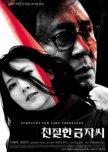
It´s Girl Power time! Outrageous, luminous angelic + consistently deadly, too. Pitch-black humour.
"Sympathy for Lady Vengeance" or in the original "Lovely Geum-ja" is grossly funny, bitterly satirical, with a huge portion of pitch-black, bone-dry, unpredictable humor. The KMovie playfully juggles with details that seem to have sprung from a film noir and, above all, deliberately wants to irritate with the aestheticizing stylization of bloodthirsty revenge.Geum-ja is an Angel of revenge in the most literal sense. Luminous, angelic in her kindness, yet consistently deadly when it comes to her revenge mission. This makes the KMovie a paradoxical, incomparable experience: bizarre, absurd, dark and yet pointedly funny.
It´s is Girl power time! Patriarchy is in the pillory, regarding various offenses and arrogance of most of the male characters. Geum-ja (convincing to the point: Lee Young-ae) offers the entire program of associations with the feminine in its blatant contradictions: saint, whore, witch, as well as mother, lover, friend. Guilty in naive innocence. Outrageous. Diabolical. Sovereign. Powerful. Decided. Efficient. Exhilarated. Significantly, a remix of Vivaldi's "Ah ch'infelice semper" swings the baton in the background.
Storytelling is always close to Geum-ja. Not too much, just as much as is needed, is given to the audience. A serious, deeply meaningful off-screen narrator closes the gaps. As I said, the humor is pitch-black.
By the way, the KMovie (which has also received many international awards) is the third part of a revenge trilogy by director Park Chan-wook, which includes "Oldboy", that is considered one of the most influential films of contemporary South Korean cinema.


 9
9 38
38 15
15

















